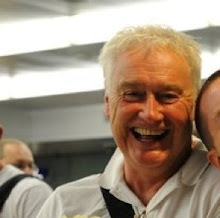Book: John Wiedman
Music and Lyrics : Stephen Sondheim
Direction and staging : Michael Strassen
Musical Director: Michael Bradley
Lighting: Steve Miller
Reviewer: JohnnyFox
The Public Reviews Rating: [3 stars]

U.S. Presidents get a raw deal from musicals … in Kaufman and Hart's 1937 I'd Rather Be Right George M. Cohan starred as Franklin Roosevelt who despite his polio paralysis sings and dances - at least in Annie he remains confined to his wheelchair whilst the ginger moppet bawls a succession of shaky key-changes into his ear. Contemporary musical satires like Michael Friedman’s 2009 Bloody Bloody Andrew Jackson, or Obama: The Musical have yet to build on early promise but at least in those none of the contenders gets shot at, as do the nine (count ‘em) potential victims in Stephen Sondheim’s Assassins currently in a new production by Michael Strassen at the Union Theatre, Southwark.
Assassins is a difficult musical to pigeon-hole. Despite comparing its vengeful plot with Sweeney Todd, it doesn’t fall in to Sondheim’s tuneful-and-waspishly-witty category alongside Follies, Company and Into The Woods. Nor is it in the obscure-but-intriguing box with Pacific Overtures, Merrily We Roll Along and Sunday in the Park. Some claim that as a series of sketches about each of the assassinations, it’s more like a revue than a musical – certainly it defeats Sondheim’s ability to make comic capital out of human relationships since the nine would-be murderers in this show scarcely have one between them and losers and loners don’t make for snappy lyrics. It’s the lack of connectivity between the characters that limits the show, and leaves you feeling cheated with only 8 songs in 90 minutes (although this version runs 110 which indicates a need for tightening and cutting).
If it has a theme it’s that in modern America ‘everybody’s got the right to his dreams’ and that even achieving notoriety by killing the President, can legitimise your pathway to fame and a book deal. In this, it shares its theme of unattained dreams and a consequent ruthlessness with Mama Rose in Gypsy, but this music is as far from the pit band jollification of the Orpheum Circuit as possible. There’s a certain cleverness in the way each is matched to its assassin’s historical period whilst still belonging to the Sondheim canon, such as a Sousa March, a Bacharach-and-David styled lounge ballad, barbershop harmony or ragtime, but none can be extracted as a ‘standard’ to survive outside the musical’s context and they don’t stay in your head long enough to hum on the way home.
Despite these structural difficulties, there are some excellent individual performances and a consistently good ensemble. The whole cast sings clearly and accurately without miking, and Glyn Kerslake (as John Wilkes Booth) John Barr as Charles Guiteau (who shot President Garfield) and Leigh McDonald as Gerald Ford’s would-be assassin Sarah Jane Moore, are particularly strong.
Not all the characters are drawn in three dimensions or allowed the full range of emotions, but Nick Holder drew every ounce of humour as well as anguish from his brilliantly realistic characterisation of Sam Byck, a bankrupt salesman in a Santa Claus suit who initiated a plot to fly a 747 into the Reagan White House.
Although there’s no set save the dingy bare walls and floor of the railway arches which form the shell of the Union Theatre, costumes and lighting are of a high standard for what is essentially a low-budget profit-share production. Fresh and thoughtful orchestrations by Richard Bates give new life to the score as played by a versatile six-piece band.
Director Michael Strassen deserves great credit for the illuminated way in which the stories are presented, and for his huge versatility in staging this recondite and convoluted piece as smartly as his much-lauded production of Company in the same space last year.
But now, please - have a go at Follies.
This review written for The Public Reviews




No comments:
Post a Comment